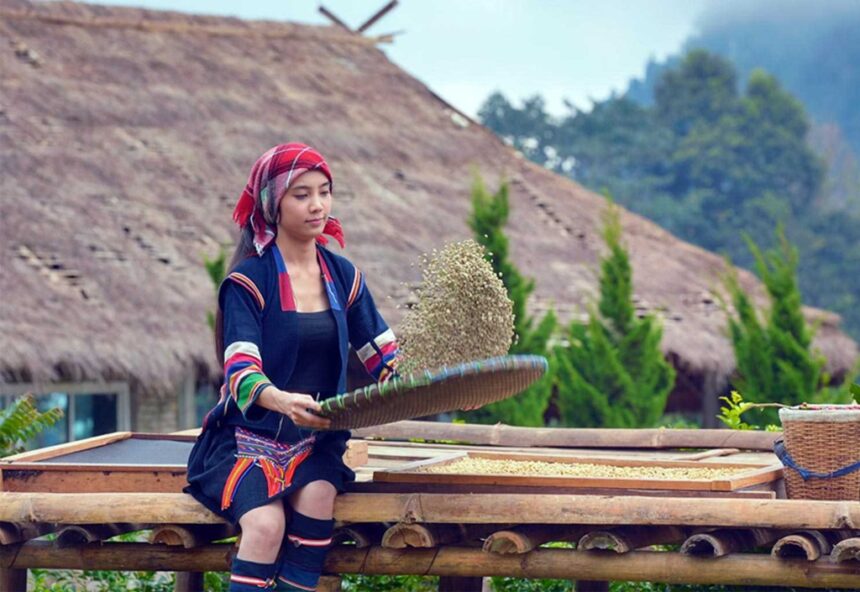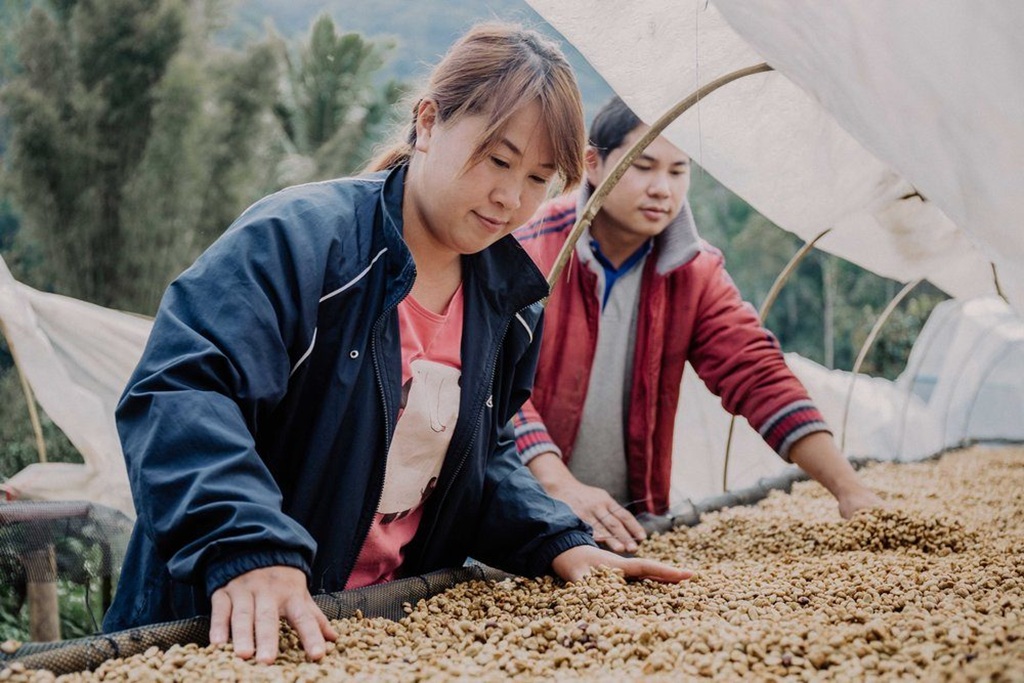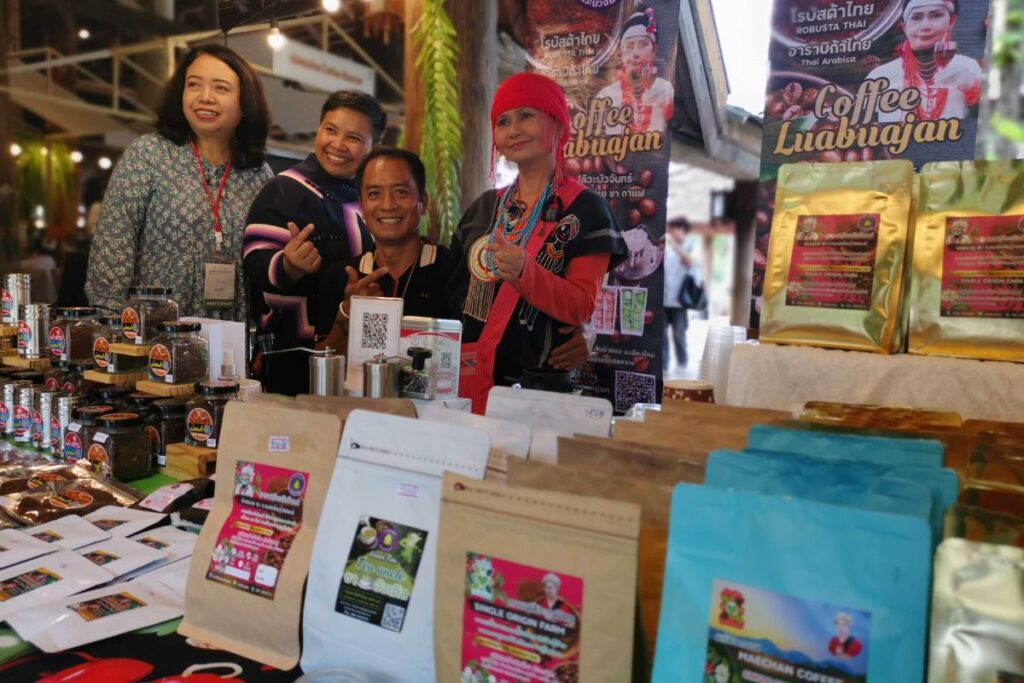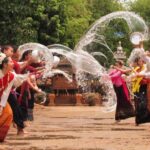Chiang Rai’s mountains, marked by mist and rolling hills, have witnessed a quiet change over the years. The hill tribe communities of Doi Chang, once reliant on the opium trade, have turned their land into a sought-after region for specialty coffee.
Grown between 1,000 and 1,700 metres above sea level, their Arabica beans now rank among the best in the world. People from across the globe come to this northern Thai province, drawn by both the coffee and the vibrant culture.
Doi Chang today is not just a place to grow beans; it has become a lively centre for unique coffee shops set against the cool mountain air, offering visitors fresh brews and scenic views.
This is the journey of Chiang Rai’s hill tribes—how they switched from hardship to opportunity, brought coffee to their villages, and boosted Thailand’s specialty coffee sector.
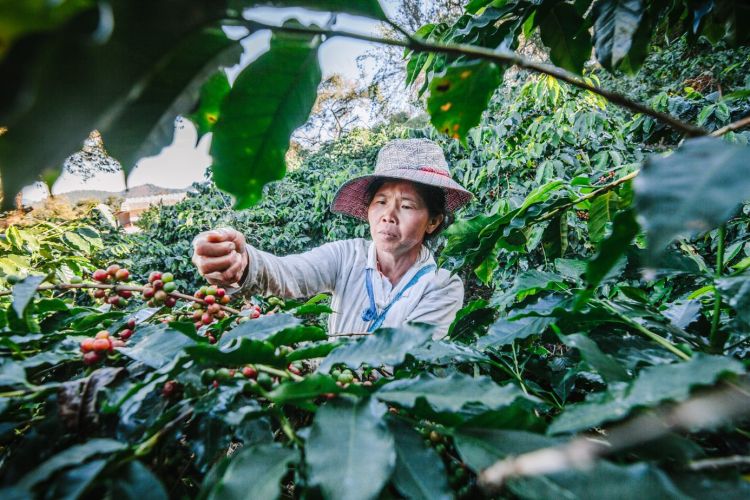
A Royal Initiative: Coffee Takes Root in Chiang Rai
In the 1960s, the region known as the Golden Triangle was still tied to opium farming. The Akha, Lisu, and Chinese hill tribes struggled with poverty and had few alternatives, given the tough landscape.
To break this cycle, King Bhumibol Adulyadej launched the Royal Project in 1969. The idea was to encourage crops that could replace opium, including Arabica coffee, which was brought in from Central America.
Chiang Rai’s height and climate, with cool nights and rich, loamy soil, proved ideal for growing quality coffee. The slow ripening of cherries at these heights gave the beans more depth and sweetness, which would later find fans around the world.
By the 1980s, help from the Thai government and partnerships such as Thai-Germany and Thai-Netherlands projects ensured that more coffee plants, along with training, reached the local farmers.
There were early struggles. Coffee was a new crop, markets were hard to reach, and many farmers without Thai citizenship faced extra hurdles. Prices offered by traders were often too low. But change had started, and by the early 2000s, a younger generation began to shape a new path for coffee in the area.
In 2003, Doi Chaang Coffee Original Co., Ltd. was created by Panachai Pisailert, Wicha Phromyong, and Phitsanuchai Kaewphichai. Their goal was to secure better prices for growers, build the Doi Chaang name internationally, and improve the quality of their coffee.
Starting with just 40 acres in Doi Chang village, the venture now covers more than 11,000 acres, thanks to the joint effort of the Akha, Lisu, and Chinese producers.
Doi Chaang Coffee’s approach is built on precision. Only the ripest cherries get picked by hand. Beans are floated in tanks to remove lower quality ones, then the famous “7-8-4” method is used: seven days of sun drying, eight months of storage, and four rounds of sorting, ending with a final hand check for the best quality.
The result is a single-origin Arabica with balanced acidity and flavours of nuts, honey, and dark chocolate, carrying certifications like USDA Organic and EU Geographical Indication.
The company uses a “Beyond Fair Trade” model shaped with Canadian businessman John M. Darch. Growers receive half the profits, which doubles typical earnings from 35,000 baht per rai to 70,000 baht. This has brought stability and pride, along with the Doi Chaang Coffee Academy, which trains hundreds of growers each year and supports local projects.
A New Coffee Destination Blooms
Doi Chang isn’t only about farming. Perched at 1,400 metres, the village now welcomes visitors to specialty coffee shops and cafes with sweeping views. The Doi Chaang Coffee Estate is a top spot, letting guests follow the coffee process from the tree to the cup. The estate’s café, with space inside and outside, is a meeting point for tastings and tours. Here, staff share stories of each blend’s roots and methods.
Another stand-out name is Akha Ama Coffee, set up by Lee Ayu Chuepa, an Akha native who put his small village, Mae Chan Tai, on the map for coffee. Akha Ama now has branches in Chiang Mai, Bangkok, and Tokyo, focusing on small-batch Arabica and building strong local ties.
Roots BKK, which also sources from Doi Chang, works with farmer Nawin Kaewphichai, who tests sustainable ideas like using coffee cherry husks as natural fertiliser. Coffee shops along Doi Chang’s “sky road” offer not just drinks but a deep look at local life and traditions.
The rise in these cafés is part of a wider trend: coffee tourism. The Doi Chaang Coffee Festival draws crowds each year during the harvest. Visitors can join in cherry picking, bean sorting, and tasting sessions.
The Doi Chaang Academy supports agrotourism, with locals such as Sukkamon Thepin leading efforts to promote “coffee tourism” and share the area’s natural and cultural riches.
Thailand’s specialty coffee market has grown quickly, with Chiang Rai at its heart. The country now ranks among the top 25 coffee exporters worldwide, a big step for a nation once seen as a tea country.
This shift is powered by a rise in demand for quality, eco-friendly beans both locally and overseas. Specialty coffee stands out for traceable roots, unique taste profiles, and fair production methods—all found in Chiang Rai’s Arabica.
The Thai Coffee Association, created in 1982, has helped the cause with research and training. Government support for women’s empowerment and grants has also helped growth.
City dwellers in Bangkok and Chiang Mai are turning from instant coffee to specialty drinks, helping shops like Akha Ama and Doi Chaang reach new fans. Premium coffee is now widely available, sometimes at prices as low as 80 baht for a frappe.
Internationally, Doi Chaang Coffee exports to Canada, the USA, England, South Korea, and Singapore. Their work with international partners, and the fresh ideas of leaders such as Phitsanuchai Kaewphichai, who brings wine-making techniques to coffee, have put Thai coffee on the world map alongside Brazil and Colombia.
Positive Change for People and Planet
The success of coffee has brought more than money to Chiang Rai. Arabica grows best under shade trees and helps restore forests, cutting back on deforestation caused by earlier farming methods and opium crops. Today, Doi Chang’s 30,000 rai of coffee share space with thriving forests, showing a real commitment to protecting the land.
Coffee has also brought hill tribe groups together. The Akha, Lisu, and Chinese communities, once pushed aside, now take pride in being known as “Doi Chang coffee producers.” Younger leaders such as Lee Ayu Chuepa and Sukkamon Thepin mix tradition with modern business, connecting their culture with global tastes.
As Chiang Rai’s specialty coffee sector keeps growing, Doi Chang stands as a sign of hope and progress. The shift from opium to high-quality coffee highlights what vision and teamwork can achieve. Coffee lovers visiting Doi Chang aren’t just getting a top brew; they are part of a story about a community rewriting its future, one cup at a time.
Those keen to explore this journey can visit the Doi Chaang Coffee Estate and its nearby cafés, where the spirit of Thai coffee is alive. As the coffee industry strengthens, Chiang Rai’s hill tribes prove that their beans represent change, pride, and a new chapter for their region.




